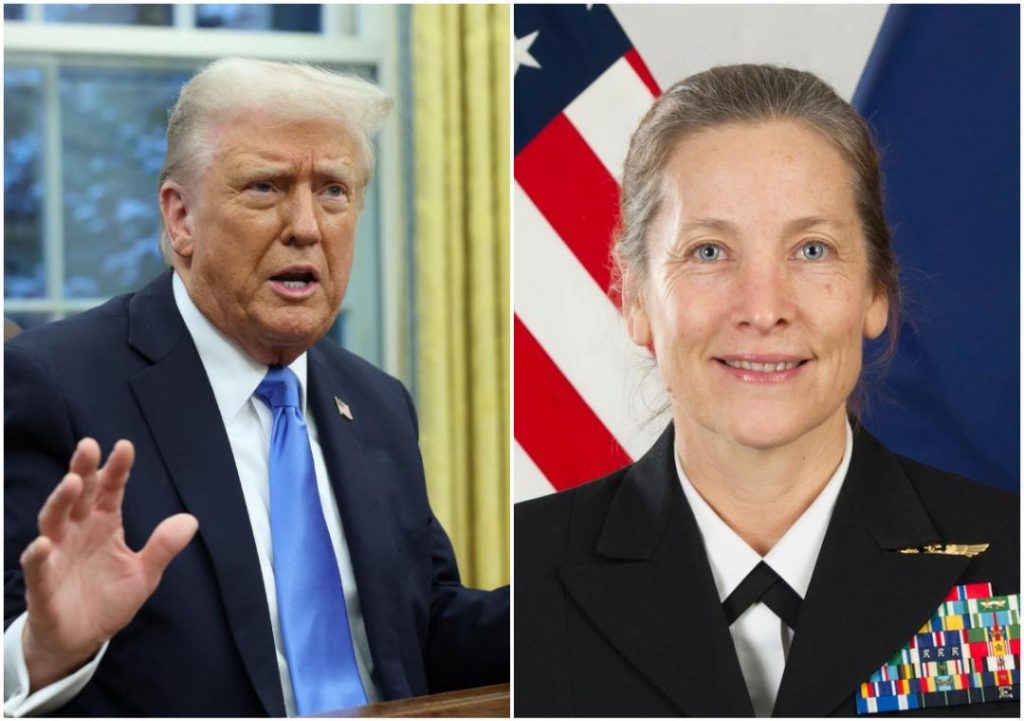
Title: Trump Administration Fires Only Woman on NATO’s Military Committee
In a shocking move, the Trump administration has fired US Navy Vice Admiral Shoshana Chatfield, the only woman on NATO’s military committee. The news was confirmed by US officials on Monday, but no clear reason was given for her removal. However, it appears that her public support for diversity within the military ranks may have contributed to her dismissal.
Vice Admiral Chatfield’s removal has sparked widespread outrage and criticism, with many questioning the motivations behind the decision. Her departure is seen as a significant setback for diversity and inclusion in the military, particularly at a time when the US is struggling to promote representation and equality.
So, who is Shoshana Chatfield, and what was her role on NATO’s military committee?
Shoshana Chatfield is a highly decorated naval officer with over 30 years of service. She has held various leadership positions, including serving as the Commander of the Navy’s Naval District Washington. In 2020, she was appointed as the Vice Director for Operations on the Joint Staff, a role that made her the first woman to hold the position.
Chatfield’s appointment to NATO’s military committee was a significant milestone, marking the first time a woman had held the position. As a member of the committee, she played a critical role in advising NATO’s Secretary General and coordinating military operations among member countries.
However, Chatfield’s appointment was not without controversy. In August 2020, the American Accountability Foundation, a conservative think tank, released a report labeling her as “woke.” The report accused her of promoting “radical left-wing ideologies” and “woke military policies.” Chatfield had publicly spoken about the importance of diversity and inclusion in the military, stating that it was essential for building a stronger and more effective force.
The “woke” label is often used to discredit individuals who promote progressive values and challenge traditional norms. In this case, it appears that Chatfield’s commitment to diversity and inclusion was seen as a liability by the Trump administration.
The timing of Chatfield’s removal is also suspicious. Her departure comes just days after the US presidential election, which saw Joe Biden defeat Donald Trump. It is unclear whether Chatfield’s removal was a retaliatory move by the Trump administration or a pre-planned decision.
The consequences of Chatfield’s removal are far-reaching. Her departure sends a message that the Trump administration is not committed to promoting diversity and inclusion in the military. It also undermines the progress made by women in the military, who have been working to break down barriers and achieve greater representation.
Moreover, Chatfield’s removal raises questions about the Trump administration’s approach to international relations. As a member of NATO’s military committee, she played a critical role in shaping the alliance’s military strategy and operations. Her departure may impact the alliance’s ability to respond to emerging security threats and promote stability in the region.
In conclusion, the Trump administration’s decision to fire Shoshana Chatfield is a significant setback for diversity and inclusion in the military. Her removal sends a message that the administration is not committed to promoting progressive values and challenging traditional norms. As the world looks to the future, it is essential that we prioritize diversity and inclusion in our institutions, including the military. We must also hold our leaders accountable for promoting progressive values and challenging systemic inequalities.
Source:






